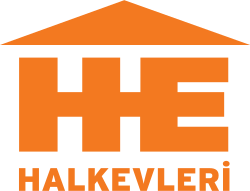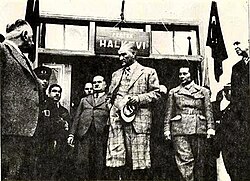Halkevleri
 | |
 | |
| Predecessor | Turkish Hearths |
|---|---|
| Founded | 19 February 1932 |
| Founder | Mustafa Kemal Atatürk |
| Headquarters | Çankaya, Ankara |
Governing body | Executive Board |
| Affiliations | Republican People's Party (formerly) |
| Website | halkevleri.org.tr |
The Halkevleri (Turkish for "Peoples' houses") is a non-profit organisation dedicated to promoting culture, arts, history, and sports among the Turks. It was established by the Republican People's Party in 1932, in the course of the Turkish Revolution, and managed to rally millions into local community centres until its closure in 1951, when the Democrat Party ascended to the government.[1]
Following the 1960 coup d'état, which overthrew the Prime Minister Adnan Menderes, the subsequent democratic reforms paved the ways to the rebirth of Halkevleri, this time rather as an independent NGO that does not receive government funding ─ although it was not considered as effective as the original Halkevleri, it still succeeded in community outreach, only to be shut down by the 1980 coup d'état, ending up in imprisonment of prominent figures and the confiscation of its properties.[2]
Background
[edit]The Turkish Republic was proclaimed in 1923 after a series of costly wars involving the Ottoman Empire. The human loss was great, especially among intellectuals. The most profitable agricultural land had been lost and the country was economically bankrupt. After the republic was proclaimed, measures were taken to raise the low literacy rate and to improve the economy. However, the Great Depression was another blow to the new republic. A second problem of the new republic was the reaction of the conservatives against the reforms, especially the secularist practices of the republic. The Halkevleri can be seen as the successors of the Turkish Hearths, a Turkish social institution that was disestablished before the founding of the Halkevleri in 1932.[3]
The scope of the project
[edit]Halkevleri was an enlightenment project aimed towards city dwellers to gain support for reforms. It was planned by Kemal Atatürk, the founder of modern Turkey.[citation needed]
On 17 February 1932, branches of Halkevleri were opened in 17 cities. (Adana, Ankara, Bolu, Bursa, Çanakkale, Denizli, Diyarbakır, Eskişehir, Istanbul, İzmir, Konya, Malatya, and Samsun.) But soon the number increased to 478. Towards 1940, the villages were also included in the project. The sub branches in villages were called Halkodaları (English: People’s rooms) Towards 1950, the total number of these subsections exceeded 4,000.[citation needed]
The activities
[edit]The purpose of the project was to enlighten the people and to decrease the influence of the conservative circles. Free courses were offered on the topics of literature, drama, music, fine arts, speaking, and writing as well as handicrafts and tailoring. Folk say and folksongs were surveyed. Halkevleri also had 761 libraries and reading rooms.[4]

Halkevleri operated as a state organization from 1932 till 1951. During the multiparty period (after 1945), Halkevleri were severely criticized on the ground that this project was a supporter of the governing Republican People's Party.[5] The opposing Democrat Party won the 1950 elections. On 8 August 1951, Halkevleri were closed.[6]
Publications
[edit]Halkevleri published nearly seventy-five periodicals, including Ülkü which was published from February 1933 and August 1950.[7]
See also
[edit]References
[edit]- ^ Olgun, Kenan (2019). "Türkiye'de Halkevleri Gerçeği" (PDF). İksad Publishing House. Retrieved 8 August 2025.
- ^ "Hakkımızda - Halkevleri". halkevleri.org.tr. Retrieved 8 August 2025.
- ^ Kemal Karpat (2015). Turkey's Politics: The Transition to a Multi-Party System. Princeton University Press. p. 55. ISBN 978-1-4008-7942-7.
- ^ Halkevleri page Archived 27 January 2009 at the Wayback Machine (in Turkish)
- ^ Altan Öymen. (2009). Öfkeli Yıllar, Doğan Kitap, ISBN 978-605-111-401-9, pp. 203-220
- ^ Türkiye’nin 75 yılı, Tempo, Istanbul, 1998
- ^ Betül Karcı. "Ülkü Dergisi (Ülkü Magazine)". Atatürk Encyclopedia (in Turkish).